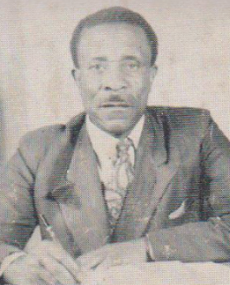
Arthur Nuthall Fula was born on 16 May 1908 in East London, Transkei (now Eastern Cape Province). In 1910, his parents – Samuel and Alice (née Stuurman) Fula – moved north to George Goch in Johannesburg, Transvaal Province (now Gauteng). He attended the Siemert School for Coloureds before going to the Eurafrican Normal College, however, he was unable to complete his primary school teacher’s diploma.
From the age of 17, Fula worked as a clerk, miner, and labourer on two different gold mines. From his late-twenties until his early forties, he was a cabinet-maker working at a local furniture factory. After the factory went out of business, he tried to start his own workshop, however, that also failed. In 1952, following a period of unemployment, he was employed as an interpreter at the Johannesburg Magistrate’s Court. Despite not having any formal qualifications for the position, Fula was exceptionally qualified. In addition to his mother tongue, isiXhosa, Fula was fluent in isiZulu, Setswana, Sesotho, Sepedi, English, French (he learnt French at the Alliance Française centre), and Afrikaans, which he learnt as a young boy when his family moved to Johannesburg.
During his period of unemployment, Fula started writing. His early writings comprised mostly of poems, letters to the press, and English short stories – most of which remain unpublished. By the mid-1940s, he had completed two English novels; however, his attempts to have these novels published in Europe and America were unsuccessful. Nonetheless, this did not deter him, as his failure proved to be the motivation he needed to ensure that his voice would be heard.
He decided to change from writing in English to writing in Afrikaans. In early 1954, he published his first Afrikaans novel, Johannie giet die Beeld (Johannesburg Moulds the Graven Image), which was a success. It was generally well-received by White Afrikaans readers and even enjoyed a second print run – something uncommon for a debut novel which made him an overnight sensation. Originally 5000 books were printed but an additional 3000 followed after the positive reception. He followed this up with his second novel, Met erbarming, O Here (With Compassion, Oh Lord), in 1957.
Soon after it was published, Johannie giet die Beeld was translated into German as Im Goldenen Labyrinth: Erzählung aus Johannesburg (In the Golden Maze: A Tale from Johannesburg, 1956), Finnish as Kultaa ja Kurjuutta (Gold and Misery, 1960) and English as The Golden Magnet (1984) which was published by Three Continents Press in Washington DC, United States of America (USA). Although some of his other works, mostly poetry, were published in the collections of the Swiss librarian and Africanist Peter Sulzer (1917-2009), a large volume of his early works remains unpublished and have been lost.
In an unpublished chapter of Sulzer’s manuscript, Südafrika im Spiegel der Afrikaans Literatur (South Africa as mirrored in Afrikaans literature, 1965), some of Fula’s unpublished works mentioned include numerous poems, his autobiographical text, Die Lotgevalle van ‘n Naturelle-skrywer (The Trials and Tribulations of a Native Writer), his novel Dogter van die Zoeloe (The Daughter of the Zulu), the Xhosa text Lahliwe (Thrown Away), his short stories Matsiliso van Phomolong (Matsiliso of Phomolong) and Ulinipisi (The Rinderpest). None of the original versions of his poetry written in Afrikaans exists or is accessible.
Fula was a pioneer in his own right, becoming the first Black African author to write in Afrikaans – a language that was synonymous with the oppressors during apartheid South Africa. Furthermore, his choosing of Afrikaans as his primary literary language (which was, in fact, his third language) allowed him to bridge the social and political divide at a time when this seemed virtually impossible to do.
On 14 May 2016, the Department of Sport, Arts, Culture and Recreation, the National Afrikaans Literature Museum (NALN) and the Sesotho Literary Museum held an Arthur Fula commemoration event to recognise and pay tribute to the pioneering author. The event, which was held in Bloemfontein, Free State Province, was attended by members of the Fula family, including his three surviving daughters and son, along with several grandchildren and great-grandchildren.
In 2017, he was posthumously awarded the National Order of Ikhamanga in Bronze in recognition of his excellent contribution to the field of literature and breaking stereotypes by writing in the Afrikaans language.
Although Johannie giet die Beeld and Met erbarming, O Here garnered Fula a lot of attention, over the years both his name and his literary works have become largely forgotten, even among Afrikaans literary scholars.
Fula died on his 58th birthday in 1966 from a stroke, in Soweto, Johannesburg.